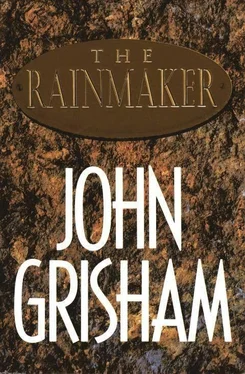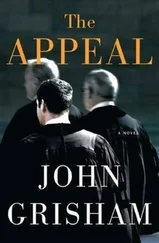She describes the frustration of being a mother and not being able to provide health care for a dying son. She wrote and called Great Benefit many times. She wrote and called congressmen and senators and mayors, all in a vain effort to find help. She pestered local hospitals to provide free care. She organized friends and neighbors to try and raise the money, but failed miserably. She identifies the policy and the application. She answers my questions about the purchase of it, the weekly visits by Bobby Ott to collect the payments.
Then we get to the good stuff. I hand her the first seven letters of denial, and Dot reads them to the jury. They sound worse than I hoped. Denial outright, for no reason. Denial from claims, subject to review by underwriting. Denial by underwriting, subject to review by claims. Denial from claims based on preexisting condition. Denial from underwriting based on the fact that Donny Ray was not a member of the household since he was an adult. Denial from claims based on the assertion that bone marrow transplants are not covered by the policy. Denial from claims based on the assertion that bone marrow transplants are too experimental and thus not an acceptable method of treatment.
The jurors hang on every word. The stench is descending.
And then, the Stupid Letter. As Dot reads it to the jury, I watch their faces intently. Several are visibly stunned. Several blink in disbelief. Several glare at the defense table, where, oddly enough, all members of the defense team are staring down in deep meditation.
When she finishes, the courtroom is silent.
“Please read it again,” I say.
“Objection,” Drummond says, quickly on his feet.
“Overruled,” Kipler snaps.
Dot reads it again, this time with more deliberation and feeling. This is exactly where I want to leave Dot, so I tender the witness. Drummond takes the podium. It would be a mistake for him to get rough with her, and I’ll be surprised if he does.
He starts with some vague questions about former policies she carried, and why she happened to purchase this particular policy. What did she have in mind when she bought it? Dot just wanted coverage for her family, that’s all. And that’s what the agent promised. Did the agent promise her the policy would cover transplants?
“I wasn’t thinking of transplants,” she says. “I never had need of one.” This causes some smiles in the jury box, but no one laughs.
Drummond tries to press her on whether she intended to purchase a policy that would cover bone marrow transplants. She’d never heard of them, she keeps telling him.
“So you didn’t specifically request a policy that would cover them?” he asks.
“I wasn’t thinking of these things when I bought the policy. I just wanted full coverage.”
Drummond scores a weak point on this, but I think and hope it will soon be forgotten by the jury.
“Why’d you sue Great Benefit for ten million dollars?” he asks. This question can produce disastrous results early in a trial because it makes the plaintiff appear greedy. The damages sought in lawsuits are often just figures pulled out of the air by the lawyer with no input from the clients. I certainly didn’t ask Dot how much she wanted to sue for.
But I knew the question was coming because I’ve studied the transcripts from Drummond’s old trials. Dot is ready.
“Ten million?” she asks.
“That’s right, Mrs. Black. You’ve sued my client for ten million dollars.”
“Is that all?” she asks.
“I beg your pardon.”
“I thought it was more than that.”
“Is that so?”
“Yeah. Your client’s got a billion dollars, and your client killed my son. Hell, I wanted to sue for a lot more.”
Drummond’s knees buckle slightly and he shifts his weight. He keeps smiling though, a remarkable talent. Instead of retreating behind a harmless question or even taking his seat, he makes one last mistake with Dot Black. It’s another of his stock questions. “What’re you going to do with the money if the jury gives you ten million dollars?”
Imagine trying to answer this on the spur of the moment in open court. Dot, however, is very ready. “Give it to the American Leukemia Society. Every penny. I don’t want a dime of your stinkin’ money.”
“Thank you,” Drummond says, and quickly gets to his table.
Two of the jurors are actually snickering as Dot leaves the witness stand and takes her seat next to me. Drummond looks pale.
“How’d I do?” she whispers.
“You kicked ass, Dot,” I whisper back.
“I gotta have a smoke.”
“We’ll break in a minute.”
I call Ron Black to the stand. He too has a script, and his testimony lasts for less than thirty minutes. All we need from Ron is the fact that the tests were run on him, he was a perfect match for his twin brother and that at all times he was ready to be the donor. Drummond has no cross-exam. It’s almost eleven, and Kipler orders a ten-minute recess.
Dot runs to the rest room to hide in a stall and smoke. I warned her against smoking in front of the jurors. Deck and I huddle at our table and compare notes. He sits behind me, and he’s been watching the jurors. The denial letters got their attention. The Stupid Letter infuriated them.
Keep them mad, he says. Keep em riled. Punitive damages come down only when a jury is angry.
Dr. Walter Kord presents a striking figure as he takes the stand. He wears a plaid sport coat, dark slacks, red tie, very much the successful young doctor. He’s a Memphis boy, local prep school, then off to college at Vanderbilt and med school at Duke. Impeccable credentials. I go through his resume and have no trouble qualifying him as an expert in oncology. I hand him Donny Ray’s medical records, and he gives the jury a nice summary of his treatment. Kord uses layman’s terms whenever possible, and he’s quick to explain the medical vernacular. He’s a doctor, trained to hate courtrooms, but he’s very at ease with himself and the jury.
“Can you explain the disease to the jury, Dr. Kord?” I ask.
“Of course. Acute myelocytic leukemia, or AML, is a disease that strikes two age groups, the first being young adults ranging in age from twenty to thirty, and the second being older people, usually above the age of seventy. Whites get AML more than nonwhites, and for some unknown reason, people of Jewish ancestry get the disease more than others. Men get it more than women. For the most part, the cause of the disease is unknown.
“The body manufactures its blood in the bone marrow, and this is where AML strikes. The white blood cells, which are the ones in charge of fighting infection, become malignant in acute leukemia and the white cell count often rises to one hundred times normal. When this happens, the red blood cells are suppressed, leaving the patient pale, weak and anemic. As the white cells grow uncontrollably, they also choke off the normal production of platelets, the third type of cell found in bone marrow. This leads to easy bruising, bleeding and headaches. When Donny Ray first came to my office, he complained of dizziness, shortness of breath, fatigue, fever and flu-like symptoms.”
When Kord and I were practicing last week, I asked him to refer to him as Donny Ray, not as Mr. Black or patient this or that.
“And what did you do?” I ask. This is easy, I tell myself.
“I ran a routine diagnostic procedure known as a bone marrow aspiration.”
“Can you explain this to the jury?”
“Sure. With Donny Ray, the test was done in his hip bone. I placed him on his stomach, deadened a small area of skin, made a tiny opening, then inserted a large needle. The needle actually has two parts, the outer part is a hollow tube, and inside it is a solid tube. After the needle was inserted into the bone marrow, the solid tube was removed and an empty suction tube was attached to the opening of the needle. This acts sort of like a syringe, and I extracted a small amount of liquid bone marrow. After the bone marrow was aspirated, or removed, we ran the usual tests by measuring the white and red blood cells. There was no doubt he had acute leukemia.”
Читать дальше












